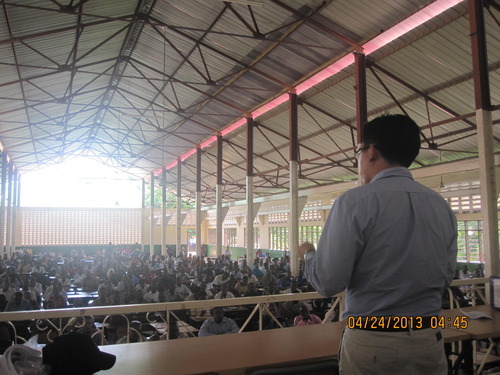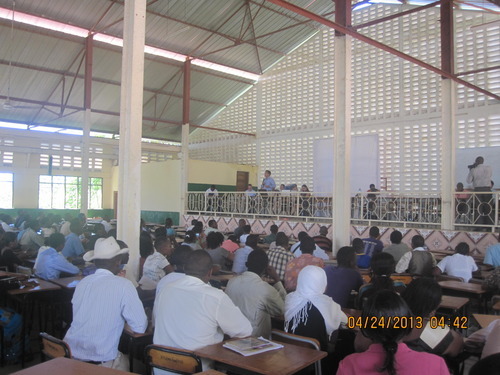
24 April
The
CSC team went to Eckernforde University Tanga on 24 April to deliver a
lecture. Eckernforde is a private university with students mostly taking
courses in education, business and technology. A university lecture is
normally part of the CSC experience so participants have a chance to
share their work and their experiences with students while also helping
promote their CSC projects. The team delivered a lecture on the
following topics: IBM and its expansion in Africa, the future of
technology and how IBM is making the planet smarter, lessons learned
from the career experiences of IBMers from growth markets, and
communication skills for the first interview. In my speech, I emphasized
how privileged they were to be in college as less than 1% of students
in Tanzania ever reach tertiary education and that they should take this
as a responsibility to lead and be successful so that they might create
the same opportunities for their countrymen.
The
day before the lecture, the team had a big debate in the conference
room about the simple question of whether to keep the students in the
lecture hall once we open the floor for questions or to divide the
students into groups so they could interact more closely with the team.
In the end, it was much ado about nothing. The premise for the proposal
to divide the group was a false assumption that the students would be
too timid to ask questions. As it turned out, that assumption could
hardly be further from the truth. Shy they were not, the students of
Tanga!
As soon as we opened the
discussion, questions began pouring in. It was a large lecture hall with
over five hundred students, but those who wanted to ask questions were
undeterred. In addition, they were also sending scores of written
questions. We were unprepared for the kind of questions they asked. We
were expecting questions about jobs in IBM or career advice in general.
Instead, they began peppering us with questions about the dangers of
globalization, the role of multinational corporations in emerging
markets, and IBM's position on key issues of international relations.
There
was one student whose line of questioning made us squirm. Instead of
welcoming us as guests and thanking us for our effort, he questioned the
motives of IBM in visiting the university for a second time without
bringing any material things. He suggested we were there to take
pictures and nothing more.
They asked questions about
what material things we were bringing to Africa. I told them it was not
helpful to keep thinking the white man will bring gifts to them and that
the white man will bring them out of poverty. I told them that China
and India are growing the way they are because young men like them
started taking responsibility and began building businesses and creating
jobs. They asked questions about the dangers of globalization including
brain drain. I told them that while globalization has its dangers, it
was important to take advantage of its benefits. Globalization actually
enables countries to reduce brain drain because technology now enables
engineers in India and accountants in the Philippines to provide the
same service without moving to the United States. They asked about how
corporations like IBM are training Africans to make machines instead of
selling machines to them. This was the old underdevelopment thesis about
developing countries being exploited for raw material and becoming the
market for finished goods. They said it was only the white man who makes
machines. I told them that if he insisted on talking about skin color,
then it is not the white man, but the yellow man from China who is
making all the machines now! Furthermore, manufacturing is no longer the
only path to growth. India grew so fast in the last few decades because
of services. They became the back office and IT helpdesk of the world. I
then reinforced the point that in today's knowledge economy, it is not
material things that matter but their ability to educate their workforce and build human capital.
It was easy for some
to think of IBM as another American company that has come to exploit the
resources of a Third World country. I believe we helped dispel that
notion by answering their questions with candor and competence, but also
simply because most of us actually come from emerging economies like
Tanzania. It was hard to argue IBM was a mzungu company when most of its
employees are not even white anymore. Most of us, especially my
colleagues from Argentina, Brazil, China, India and Mexico were actually
like them and we were on a shared journey to take our economies out of
poverty and improve the lot of our countrymen.
We were expecting to give basic career advice; we forgot that Africans are still grappling with older and deep seated, even outdated, questions of history. I can only we made a little difference in their thinking. I hope they have begun thinking of themselves not as victims of history but as agents of change. As Marta so beautifully put it, if we continue to blame others for our problems, then we believe the solutions are outside us and not within us. But if we believe the solutions are within, then we have the power to act.

We were expecting to give basic career advice; we forgot that Africans are still grappling with older and deep seated, even outdated, questions of history. I can only we made a little difference in their thinking. I hope they have begun thinking of themselves not as victims of history but as agents of change. As Marta so beautifully put it, if we continue to blame others for our problems, then we believe the solutions are outside us and not within us. But if we believe the solutions are within, then we have the power to act.
#IBMCSC Tanzania 10

No comments:
Post a Comment